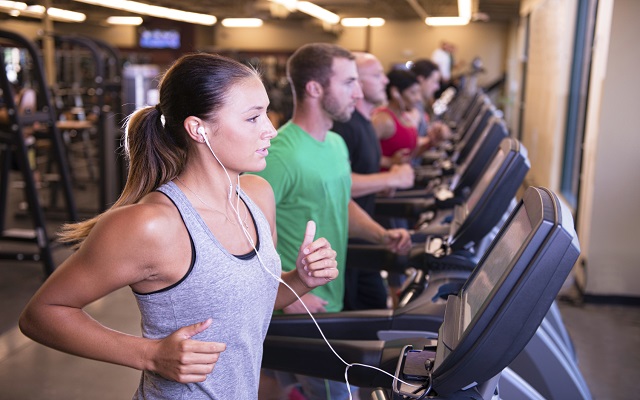During the 80s and 90s and the era of Jane Fonda workouts and Tae Bo, aerobics were in and weightlifting was out. How the tables have turned today. Now it’s all about being strong, not skinny. Having bigger arms, more definition, and rock-hard abs is definitely “in.”
No longer is there a fear of becoming too “bulky.” These days we know resistance training is an essential tool for building muscle and improving metabolism. Plus, who wouldn’t mind looking great by the time they hit the beach in the summer?
So, is cardio a complete waste of time? Couldn’t you just invest that time into doing more bicep curls, squats, and crunches?
Cardio is not the enemy. Fitness trends are constantly cycling in and out of popularity. But it’s important to remember that all types of exercises have their benefits and, just like with your diet, a well-balanced fitness regimen with a lot of variety will always be best.
You should still be doing cardio—at least two and a half hours of moderate-intensity aerobic activity per week, according to the Centers for Disease Control and Prevention (1). In fact, cardio itself offers quite a few benefits for your body that exceed that which weight training can provide alone.
Cardio Works for Your Heart
Like every other muscle in your body, the more you work your heart, the stronger it becomes. Endurance increases with exercises that improve the body’s ability to deliver oxygen to muscles. The more you engage in this type of exercise, the more blood your heart is able to pump per beat and in turn, your heart rate (even at resting) will decrease. This will make both exercise as well as everyday activities much easier.
Cardio Supports Your Brain
Studies have shown that the prefrontal cortex and medial temporal cortex (the parts of the brain that control thinking and memory) have greater volume in people who do regular exercise when compared to those who don’t. The hippocampus shrinks as we age, which often leads to impaired memory or even dementia. One study found that aerobic exercise even has the ability to reverse hippocampal volume loss caused by aging, which, in turn, improves memory and overall brain health (2).
Cardio Helps Protect Against Health Risks
Numerous studies have suggested that increasing physical activity can reduce the risk of multiple chronic diseases and health conditions including obesity, cardiovascular disease, and neurological diseases (3). One extensive research review of the scientific literature found that there were more than 24 physical and mental health conditions that exercise helped protect against (3).
You’ll Burn More Calories
Aerobic exercise or cardio is still king when it comes to driving weight loss. The more we move, the more calories we burn, and because there are fewer resting periods during aerobic exercise (as compared to other types of exercise like weightlifting) you burn a lot more.
Variety Is Key for Cardiovascular Fitness
Remember, the best exercise routine is one that is constantly changing and challenging you to improve your fitness level. If you’re someone who only likes weightlifting, try working in a cycling class or a quick jog a couple of times a week. If you’re someone who runs the same track every day, try hitting some weights at the gym or even trying a few body weight exercises in your living room.
Variety is the spice of life… and diet… and exercise—with it you might find yourself much more excited about your workouts. The possibilities are endless, so mix it up. Try a new workout every day if you like! You’re bound to find a few workouts that you truly enjoy and have fun doing.
References
- Center for Disease Control and Prevention. How much physical activity do adults need? Available at: http://www.cdc.gov/physicalactivity/basics/adults/
- Erickson K, Voss M, Prakash R, Basak C, Szabo A, Chaddock L, Kim J, Heo S, Alves H, White S, Wojcicki T, Mailey E, Vieira V, Martin S, Pence B, Woods J, McAuley E, Kramer A. Exercise training increases size of hippocampus and improves memory. Proc Natl Acad Sci U S A. 2011 Feb 15;108(7):3017-22. doi: 10.1073/pnas.1015950108. Epub 2011 Jan 31.
- Alford L. What men should know about the impact of physical activity on their health. International Journal of Clinical Practice, 2010; 64 (13): 1731 DOI: 10.1111/j.1742-1241.2010.02478.x





